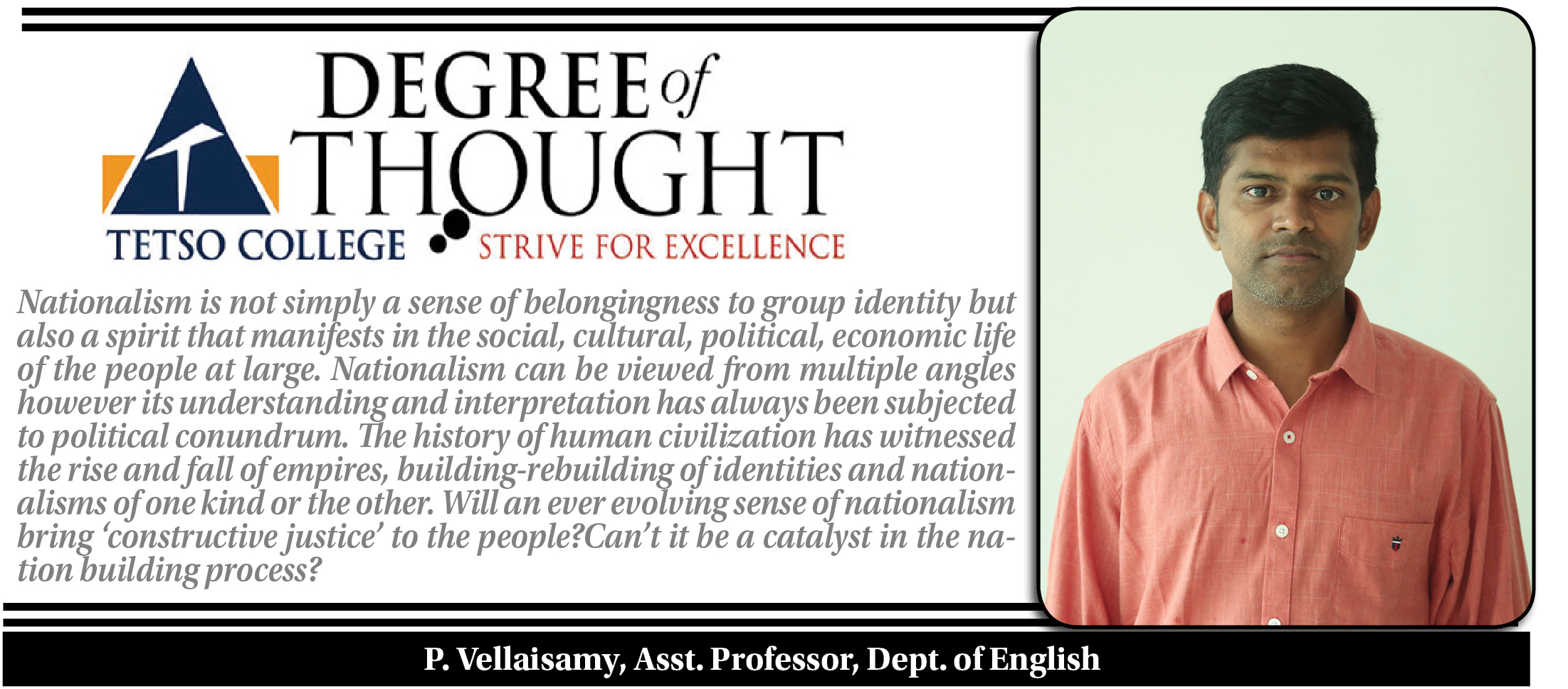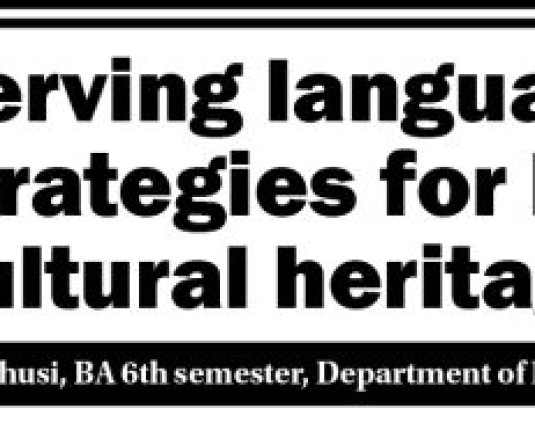1

P. Vellaisamy, Asst. Professor, Dept. of English
In 2019, in a panel discussion on an international news channel, Tarun Vijay, a BJP leader, in an attempt to defend India against the charge of racism following attacks on African students, commented, "If we (Indians) were racist, why would we have the entire South? Which is you know... completely Tamil, you know Kerala, you know Karnataka and Andhra. Why do we live with them? We have blacks, black people all around us." Here, the argument by Vijay demonstrates thatNorth Indians are generous and tolerant enough to live peacefully with the dark-skinned Dravidians; it is an obvious manifestation of racism.
However, on the other hand, Prime Minister Narendra Modi quotes Tamil classical literature and language in his speech onseveral occasions. In his speech at the United Nations General Assembly (UNGA) on 27th September, 2019, Modi, quoted the ancient Tamil philosopher Kaniyan Pungundranar’s verses – “Yaadhum oore yaavarum kelir” (We belong to all places and everyone) – emphasizing the sense that “belonging beyond borders is unique to India.” He also said on another occasion that Tamil is the “world’s oldest language.”
At the outset, Modi’s new found love for Tamil, repeated invocation of Tamil, may imply that it is a political design of the BJP to make inroads into Tamil Nadu where the party could not secure a seat during the time of ‘Modi wave’; rather, it is an attempt to silence and homogenize history and identity. Here, Modi silences the fact that the inhuman caste system is unique to India, which is the invention of Hindu religious text/Hinduism. Incaste ridden IndiaDalits have not felt the sense of belonging in their own homeland for centuries. On the other hand, the Tamil verse – which was written two thousand years when there was no idea of India – cited by the Prime Minister by claiming that “belonging beyond borders is unique to India”, it is one of those attempts of Indian/Hindu nationalists to claim that India is not a construction but a nation which is culturally united and historically true.
In an attempt to homogenize history and identity, Tamil Nadu’s official Twitter handle of BJP posted the photo of Thiruvalluvar, a Tamil poet, who wrote Thirukkural (which speaks about universal ethics and morality – virtues, wealth and love) two thousand years before, in saffron ropes and holy ash smeared on his forehead as an attempt to saffronize his identity. Moreover, the BJP leaders also claimed that Thiruvalluvar, believed in Hindu principles and teachings. However, Tiruvalluvar, on the contrary to Hindu principles, believed in equality by birth for all living beings. While Tamil nationalists popularize Thiruvalluvar as a universal icon, Indian/Hindu nationalists reduce him as a Hindu. In fact, manipulation and appropriation of distinct cultures and identity is part of the Indian/Hindu nationalist and historians since colonial times. In the eighteenth and nineteenth century, nationalists felt heterogeneity of tradition was a threat to Indian unity and attempted establishing a new idea of nation as an age-old community of many faiths and creeds. While Tamil nationalism imagines its identity, culture, civilization and history in antagonism to Brahmanis and Aryan or Hindu culture, Indian/Hindu nationalists, in order to homogenize, distort and appropriate heterogeneous identity and history as Hindu or Indian history. It is one of those attempts to assert on the part of nationalists that India is a nation which is historically true. However, India is not a nation but it is a country which includes different nationalities. India as a country would not have been possible without the consent of the toiling class. Notwithstanding, as a parallel and to counter the so-called ‘upper-caste elite’ and Hindu or cultural nationalism, the Tamil nationalists imagined a nation of casteless and democratic society. However, Tamil nationalism is ruthlessly criticized for its hegemony by Dalit intellectuals.
In response to the Indian nationalism and nation, different forms of nationalism – commonly referred to as sub-nationalism – based on language and race emerged in some parts of colonial India. One such sub-nationalism evolved from Tamil Nadu, claiming a unique culture, language and identity that are different from the identity of India constructed by elite and Hindu nationalists, which posed a threat to Indian nationalism; which was the case even in colonial India. In colonial Tamil Nadu, there were claims for a separate Dravidian Nation, which after the linguistic states were formed – diluted to Tamil nationalism. Tamil nationalism of Dravidian movements and other movements and individuals like Maraimalai Adigal, a Saivite scholar and a leader of an organization called Thani Tamil Iyakkam (Pure Tamil Movement), though however different their ideologies are, insisted the cultural uniqueness of Tamils with that of the Indian nation; they further claimed that Tamil Nadu shared no common history with India. While Indian elite historiography describes Indian culture and civilization as the culture of Aryan/Brahmin/Sanskrit oriented civilization, Adigal claims Tamil civilization to be of primarily civilized barbaric Brahmins/Aryan Brahmins. While Adigal’s Tamil nationalism was based on theism, which projected Saivism as Tamil religion as against Hinduism, Periyar’s was atheist oriented. While the former was glorifying Tamil origin and Tamil language, the latter was critical of such ideas and claims. In fact, Periyar’s Dravidian movement and later Self-respect movement critically engaged with Tamil history and claimed unique history for Tamil so as to counter and discount the legitimacy of pan-Indian history and culture. Periyar’s demand for separate Tamil Nadu and later Dravida Nadu was based on reason, rationality and science which became a base for him to criticize Indian culture, history and Hindu epics.
Various studies assert that Subnationalism or Ethnic nationalism is “positively linked to social development” and the state’s commitment to social welfare - southern Indian states are cited as the best example for social welfare policies and social development. On the other hand, however, counter nationalism resists hegemony of the homogeneity. Any “attempt to force homogeneity upon diverse populations that can set off civic strife and even wars, eventually leading to the break-up of countries.” With the emergence of Hindutva politics, it is pertinent to resist them and their agenda of homogenizing heterogeneous history and civilization.
Degree of Thought is a weekly community column initiated by Tetso College in partnership with The Morung Express. Degree of Thought will delve into the social, cultural, political and educational issues around us. The views expressed here do not reflect the opinion of the institution. Tetso College is a NAAC Accredited UGC recognised Commerce and Arts College. The editors are Dr Hewasa Lorin, Dr. Aniruddha Babar, Dr. Pfokrelo Kapesa, Webei Tsühah, Meren and Kvulo Lorin. For feedback or comments please email: dot@tetsocollege.org.





